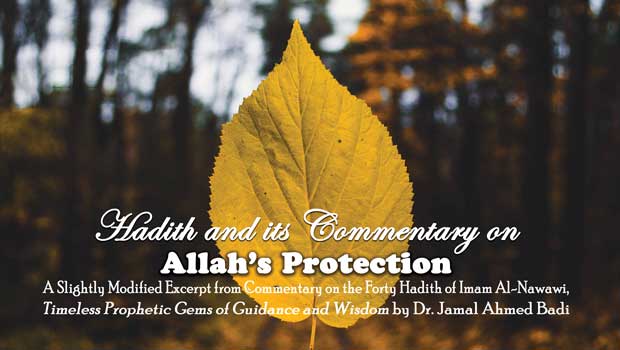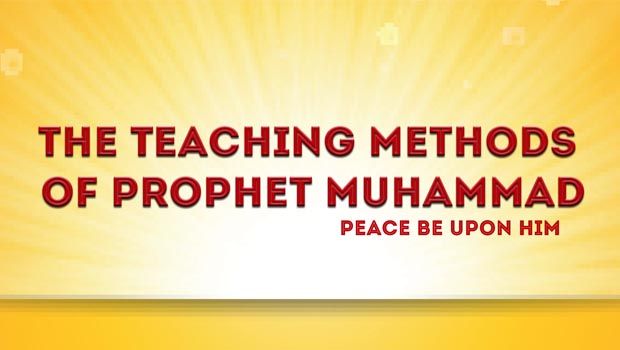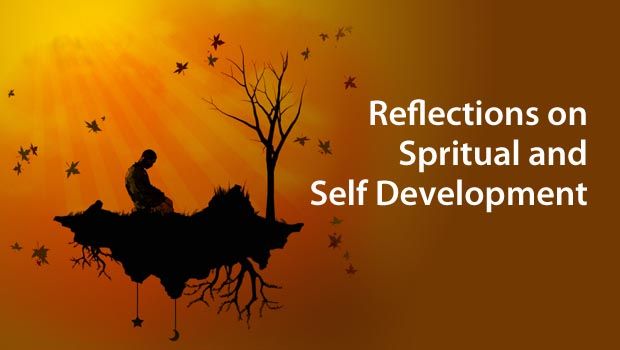An Excerpt from Commentary on the Forth Hadith of Imam Al-Nawawi
Timeless Prophetic Gems of Guidance and Wisdom
–
Abū al-ʼAbbās ʼAbdullah bin ʼAbbās (R) reported: One day I was behind the Prophet (pbuh) and he said to me: “O young man, I shall teach you some words [of advice]: Be mindful of Allah, and Allah will protect you. Be mindful of Allah, and you will find Him in front of you. If you ask, ask of Allah; and if you seek help, seek help from Allah. Know that even if the nation were to gather together to benefit you with something, they would not benefit you with anything except that which Allah has already recorded for you, and that if they gather together to harm you with something, they would not be able to harm you with anything except that which Allah has already recorded against you. The pens have been lifted and the pages have dried.” (Al-Tirmidhī relates this and says it is a good, genuine ḥadīth.)
In a version narrated by Ibn ʼAbbās in Musnad Aḥmad it reads: “Be mindful of Allah, you will find Him before you. Get to know Allah in prosperity and He will know you in adversity. Know that what has passed you by was not going to befall you; and that what has befallen you was not going to pass you by. And know that victory comes with patience, relief with affliction, and ease with hardship.”
Introduction
This ḥadīth conveys very important advice and a general ruling in Islām on seeking protection of Allah. Al-Imām Ibn al-Jawzī said: “What a pity for the one who is ignorant of this ḥadīth and has little understanding of its meaning.”
Lessons
A. Teaching Methodology
The Prophet (pbuh) starts the ḥadīth by getting the attention of Ibn ʼAbbās (R) by saying “O young man, I shall teach you some words of advice.” By saying “O young man,” Ibn ʼAbbās (R) knows that the Prophet (pbuh) is talking specifically to him. And by following it with “I shall teach you…” Ibn ʼAbbās (R) knows the importance of the next words of the Prophet (pbuh). Hence, these words at the beginning have attracted the undivided attention of Ibn ʼAbbās (R). Thus, this ḥadīth exemplifies another of the teaching methods of the Prophet (pbuh). This teaches us that when we give a talk or speech, it is important that we start with words that will grab the attention of the audience. This is to ensure that our words of advice do not fall on “deaf ears.”
B. Being Mindful of Allah
The phrase “Be mindful of Allah” means to observe and fulfill Allah’s obligations, adhering to His commandments. It also means to avoid His prohibitions. If we are mindful of Allah, He (SWT) will be close to us by giving us guidance, help, and victory. Another benefit of being mindful of Him is that He (SWT) will also protect us. There are two kinds of protection from Allah:
1. Allah (SWT) will protect His servants’ dīn and īmān. He will protect us from being misled or influenced by misconceptions and self-desires. He will help us and give guidance so that we are protected from negative influences. We may not be aware of Allah’s protection of our dīn. We may even be unhappy about it. For example, there may be a situation where Allah (SWT) prevents us from doing something which we want to do. This is actually a protection from Allah (SWT). He protects us by not allowing us to perform a particular deed, which in effect averts us from a disaster or from committing a sin. Allah (SWT) also protects us from Shayṭān’s attempt to lead us astray at the last moments of our life. This will ensure that we will leave this world having the īmān of a believer.
2. Allah (SWT) protects His servants in their worldly affairs. We enjoy the mercy and bounty of Allah (SWT) in sight, hearing, and speech. Even as we grow old, Allah still allows us to enjoy these senses as well as our intellect and mental faculties. Allah (SWT) also protects our family, property, and money. If one is mindful of Allah (SWT) during his youth, Allah will protect him during his adulthood.
The other narration of this ḥadīth mentions that if we are mindful of Allah (SWT) during times of ease, He will help us during our times of hardship. Therefore, when we are blessed with ease and prosperity, we should use that blessing to obtain the pleasure of Allah (SWT). Then, He will look after us in our times of hardship, weakness, and sickness. Even if we are no longer able to do something good that we used to do during our times of ease, Allah (SWT) will continue to reward us for that act.
Gaining Allah’s protection does not come automatically. We have to strive to maintain taqwa, and do actions being mindful of Him (SWT). Some of the things we have to do in order to gain Allah’s protection include the following:
• Performing the daily ṣalāh on time and in the best way we can.
• Protecting our hearts from being involved in maʼṣiyah especially major sins. The moment a person is weak and commits a sin or maʼṣiyah, he/she should repent due to fear of Allah (SWT).
• Guarding our senses — we should ensure that whatever we see, hear, or say is pleasing to Allah (SWT). We should fear Allah and not use these senses in a wrongful manner.
• Maintaining cleanliness and purity.
• Fulfilling our oath — if we swear by Allah (SWT) to perform an action, such a commitment needs to be fulfilled.
• Ensure that we do not consume food or drink that is not ḥalāl.
• Observing that our dealings and transactions are ḥalāl.
The statement in which the Prophet (pbuh) tells ʼAbdullah bin ʼAbbās to “ask of Allah” and to “seek help from Allah” is from the fundamentals of tawḥīd. This is something that we say in every ṣalāh in the Fātiḥah. This shows us the importance of duʼāʹ and continuously asking Allah (SWT) for His support and guidance. We need to show our need for Allah (SWT) and our total dependency on Him by performing such forms of ʼibādah.
C. Contentment with Qadr
Allah (SWT) has already written in Lawḥul Maḥfūẓ what is to take place. There are events or occurrences that we have no control over (e.g. being sick, death of a loved one, falling into hardship, etc.). Facing these events in the appropriate manner necessitates contentment. Riḍā is the highest level for us to attain where we accept and are content with whatever Allah (SWT) has chosen for us. This is regardless of whether it is positive or negative. Such contentment needs to be practiced. The second highest level is ṣabr where we need to be tolerant, patient, and calm. When we are in a difficult circumstance we need to exercise restraint without saying or doing anything that may displease Allah (SWT). There are several āyāt in the Qurʹān emphasizing the same meaning mentioned at the end of the following ḥadīth: “And if Allah touches you with hurt, there is none who can remove it but He; and if He intends any good for you, there is none who can repel His favor which He causes it to reach whomsoever of His slaves He wills. And He is the Forgiving, the Merciful” (Sūrah Yūnus, āyah 107). Some verses conveying a similar meaning include the following: “Whatever of mercy [i.e. of good] Allah may grant to mankind, none can withhold it; and whatever He may withhold, none can grant it thereafter. And He is the Exalted in Might, the Wise” (Sūrah Fāṭir, āyah 2). And in Sūrah Ḥadīd, āyah 22, we read, “No calamity befalls on the earth or in yourselves but it is inscribed in a register (Lawḥul-Maḥfūẓ) before we bring it into existence. Indeed, that for Allah is easy.”
D. Qadr and Good Deeds
In a ḥadīth in Sahih Muslim, we are informed that Allah (SWT) recorded qadr or destiny of all creation fifty thousand years before He created the heavens and the earth. In a ḥadīth regarding qadr, a man asked the Prophet (pbuh) about the need to do good deeds if it had already been decreed. It is reported by Jābir (R) that this man said: “O Allah’s Messenger, explain our religion to us as if we have been created just now. Whatsoever deeds we do today, is it because of the fact that the pens have dried [after recording them] and the destinies have begun to operate or these have effects in future? Thereupon he (pbuh) said: No, the pens have dried and destinies have begun to operate. He (the man) said: If it is so, then what is the use of doing good deeds? …. He (pbuh) said: “Act, for everyone is facilitated in what he intends to do” (Sahih Muslim).
From this ḥadīth, The Prophet (pbuh) commanded the questioner to do good deeds. However, the command was in the plural form, and thus, this command also pertains to us (i.e. the Muslim ummah) to do good deeds since everyone shall be guided to that which he/she has been created for.
E. Qadr Regarding Occurrences Under Our Control
Qadr regarding occurrences can be broadly broken down into two categories:
1. Occurrences not under our control: These are results that take place which we do not have any control over by our actions. We have to surrender to the will of Allah (SWT) with these occurrences and be patient.
2. Occurrences under our control: These are results that take place which we have control over through our actions. They can be positive or negative.
Negative events can happen as a result of our recklessness, laziness, or carelessness. Positive events on the other hand occur through our diligence, carefulness, hard work, or iḥsān. The moment these events happen, they already become qadr, and those who are responsible for the actions are accountable. Examples of actions which lead to certain results are many and are logical. Following are some examples of outcomes resulting from negative or positive actions:
• Carelessness of a construction worker leading to an accident hurting others.
• Erratic driving or speeding that leads to an accident.
• A surgeon exercising precision and care leading to a successful surgery.
• A student who studies hard and passes the exam.
Generally speaking, we are responsible for whatever we do, whether it is in worldly matters or in worship. Thus, we should act in a careful and complete manner and to the best of our ability. We are also reminded of the importance of iḥsān in our actions which generally leads to good results. We should always strive to improve ourselves and to constantly tell ourselves that we can do better. At the same time, we should not focus too much on our future, things which we have no knowledge of, or what is beyond our control, as the outcomes will not be our doing. We do the best we can and leave the rest to Allah (SWT).
Part of the appropriate understanding and belief of qadr is to stay away from things that are potentially harmful to us. This may include things that are not necessarily spelled out in the Sharīʼah. Things like not wearing a seatbelt while driving or eating a diet very high in cholesterol may cause harm to us. We should be mindful to avoid things that are bad for us, and not blame it on qadr if it happens out of our own recklessness or negligence. On the other hand, seeking treatment for an illness does not contradict qadr. If we are faced with a problem, we should make the effort to solve it or to minimize it. Thus, we should strive to take certain precautions or preventions in our lives to avoid a result that is potentially dangerous if we did not do so.
Many Muslims tend to view qadr negatively because of their lack of insight and correct understanding of this topic. Qadr needs to be understood in a positive manner. The Messenger of Allah (pbuh) commanded us to be proactive with regards to qadr by being diligent in doing good deeds, and not blame qadr for our inactivity (in doing good). Furthermore, we need to differentiate between things which we have control over versus things which we do not. Instead of merely accepting whatever has occurred as qadr, we should accept responsibility for all that we do and the choices that we make. We should analyze the reasons for why things have occurred in our life. We should make the effort to improve the situation and think on how we can avoid pitfalls.
Conclusion
This ḥadīth teaches us the importance of complete reliance and awareness of Allah (SWT). Those who are mindful of Allah (SWT) find Him as their Protector and Helper. The second part of this ḥadīth discusses the topic of qadr and that which has been decreed from His omnipotent knowledge. Part of the proper mindfulness of Allah (SWT) is to have riḍā and ṣabr in qadr, that which befalls us. In addition to this realization, we still need to understand qadr in a positive manner. We need to be proactive and take responsibility of all our actions. We also should take proper precautions so that a negative result does not occur related to our neglect.
Altogether, applying this ḥadīth will lead us to a life in which we are content and stress-free. We will be mindful of Allah (SWT), fulfill His obligations, and fully trust and accept whatever He wills for us.





